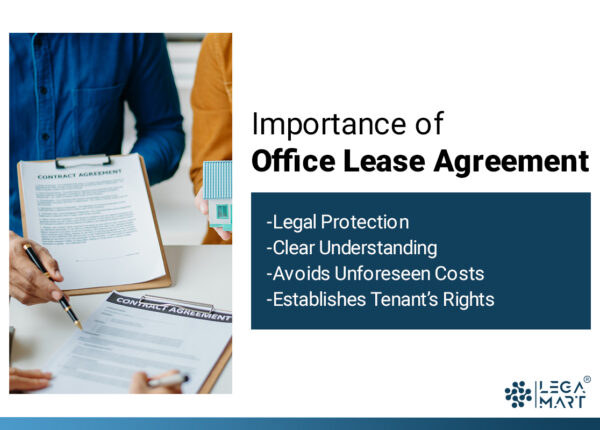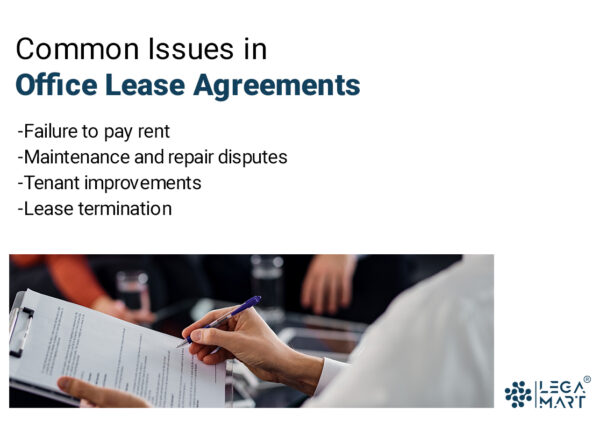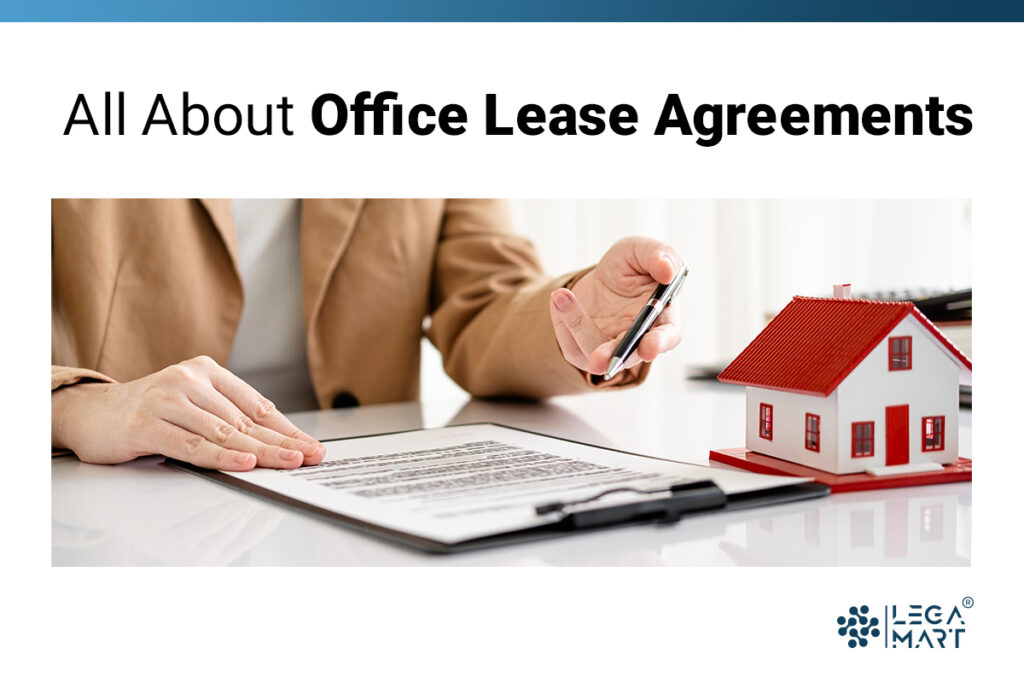Introduction
An office lease is a contract outlining the terms and conditions for using a commercial office space between a landlord and a tenant. As part of Legal Practice & Specialization, the obligations of both parties are outlined in this contract, along with the rent, lease period, maintenance requirements, approved uses, and dispute resolution procedures. Any firm that needs a physical workplace must have an office lease, which can be a complicated legal document that requires careful analysis and negotiation.
Tenants can ensure that their company has an appropriate and secure environment to develop by understanding the essential components of an office lease and negotiating favorable conditions.
Read More:
Contract Manufacturing Agreement
What Is a Non-Disclosure Agreement (NDA)?
Importance of Office Lease Agreement

An office lease agreement is a legally binding contract that outlines the terms and conditions of a lease between a landlord and a tenant for an office space. It is a critical document that helps protect both parties’ interests and ensures they understand their obligations and responsibilities clearly. Here are some reasons why an office lease agreement is essential:
Legal Protection
An office lease agreement is a legal document that protects the landlord and the tenant. It outlines the terms and conditions of the lease and specifies what actions are acceptable and what actions are not. This helps to prevent disputes and misunderstandings between the parties and serves as a legal basis for resolving conflicts.
Clear Understanding
An office lease agreement ensures both parties understand their obligations and responsibilities. It outlines the rent payment terms, lease terms, security deposit requirements, maintenance and repair responsibilities, insurance requirements, and other critical terms. This clarity helps to prevent misunderstandings and confusion, leading to a smooth and productive tenancy.
Avoids Unforeseen Costs
An office lease agreement can avoid unforeseen costs. The lease agreement specifies the rent amount, payment due dates, and rent escalation clauses. This allows tenants to budget for the rent and avoid unexpected rent increases. The lease agreement also specifies the tenant’s responsibilities for maintenance and repairs, helping them to avoid unforeseen expenses for repairs and maintenance.
Establishes Tenant’s Rights
An office lease agreement outlines the tenant’s rights, including the right to quiet enjoyment of the property and privacy. The lease agreement also specifies the conditions for the tenant to improve the property and the right to renew the lease at the end of the term.
Reviewing and understanding the lease agreement before signing is essential to avoid future disputes and misunderstandings.
Types of the Office Lease
Office leases come in different forms, each with unique features and benefits. Understanding the types of office leases available can help tenants and landlords make informed decisions when entering a lease agreement. Here are the most common office leases:
Gross Lease
A gross lease, also known as a full-service lease, is a lease agreement where the landlord covers all property expenses, including taxes, insurance, and maintenance costs. The tenant pays a fixed monthly rent, and the landlord handles all the property’s maintenance and upkeep.
Net Lease
In a net lease agreement, the tenant pays a lower monthly rent but is responsible for paying their share of the property expenses, such as taxes, insurance, and maintenance costs. The lease agreement specifies what expenses the tenant is responsible for covering.
Triple Net Lease
A triple net lease is an agreement where the tenant pays for all the property expenses, including taxes, insurance, and maintenance costs. The tenant also covers other expenses like utilities, repairs, and janitorial services.
Full-Service Lease
In a full-service lease agreement, the landlord provides all services, including maintenance, utilities, and janitorial services. The tenant pays a fixed monthly rent covering all the landlord’s services.
Modified Gross Lease
In a modified gross lease, the landlord and tenant share property expenses, such as taxes and insurance, with the tenant paying a fixed monthly rent. However, the lease agreement specifies how much each party is responsible for the property expenses.
Choosing the right type of lease for your business can be challenging, but it is essential to consider your budget, business needs, and the lease’s terms and conditions. Seek legal advice to help you understand the lease agreement’s implications and negotiate the best possible terms.
Key Terms of Office Leases
When entering into an office lease agreement, understanding the key terms of the lease can help tenants and landlords avoid misunderstandings and legal disputes. Here are some critical terms to look out for:
Rent
The lease agreement should specify the rent amount, payment frequency, and payment due dates. Tenants should understand the lease’s rent escalation clauses, determining how much rent increases over the lease term.
Lease Term
The lease term specifies the length of the lease agreement. Understanding the lease’s renewal and termination clauses is essential to avoid unexpected lease term end or renewal fees.
Security Deposit
The lease agreement should specify the security deposit amount, the conditions for refunding the deposit, and the deadlines for returning the deposit. Tenants should also be aware of any fees or deductions that may apply when returning the deposit.
Maintenance and Repairs
The lease agreement should specify which party is responsible for the maintenance and repairs of the property. Tenants should be aware of any limitations or restrictions on improving the property.
Insurance
The lease agreement should specify the type of insurance required, who is responsible for obtaining the insurance, and how insurance claims are handled.
Assignment and Subletting
The lease agreement should specify the conditions under which the tenant can assign or sublet the property to another party.
Default and Remedies
The lease agreement should specify the consequences of defaulting on the lease agreement and the remedies available to the landlord in such an event.
It is essential to review and understand the key terms of the lease agreement before signing it to avoid future misunderstandings and legal disputes. Seek legal advice to help you negotiate favorable lease terms that align with your business needs and budget. We at LegaMart offer professional and experienced help to navigate your office lease matters. We have an experienced and highly qualified team of lawyers who look into all aspects of your needs and then guide you.
Fundaments of an Office Lease Agreement
Understanding the components of an office lease agreement is critical for both landlords and tenants to ensure a successful and mutually beneficial business relationship. A well-drafted lease agreement should cover essential elements such as the property description, the lease term length, and renewal options. It should also detail the payment schedule, security deposit, tenant improvements, and allowed uses of the premises. Maintenance and repairs, insurance, assignment and subletting, and dispute resolution procedures are also critical components to consider.
Understanding each of these elements is crucial before signing a lease agreement. Tenants must carefully review the lease agreement, paying close attention to all the details, including the fine print, to ensure that the agreement meets their business needs. Seeking legal counsel is also highly recommended to ensure the lease agreement is fair and advantageous for the tenant. Experienced legal professionals can help identify any problematic language, negotiate favorable lease terms, and assist with dispute resolution in case of any issues or conflicts arising during the lease term.
Negotiating an Office Lease Agreement
Negotiating an office lease agreement can be challenging and intricate, but it is vital to securing fair and advantageous conditions for your business. To achieve a successful result, it is essential to follow these critical steps:
Firstly, it is necessary to fully understand the lease terms, including the rights and obligations of both the tenant and the landlord. This includes understanding the lease period, rent, permitted uses, and any tenant improvements or alterations that may be necessary.
Secondly, performing due diligence is essential before signing any lease agreement. This includes researching the property, the landlord, and any potential legal or financial issues that could impact the lease.
Finally, negotiating the lease conditions is critical to protecting the tenant’s interests. By negotiating the major terms of the lease agreement, including the rent, lease period, permitted uses, tenant improvements, and termination clauses, tenants can safeguard their interests, prevent conflicts, and create a secure and productive work environment.
Proactively negotiating an office lease agreement can provide numerous benefits for tenants. By negotiating favorable lease terms, tenants can reduce costs, minimize the risk of legal disputes, and ensure that their business needs are met. Seeking the assistance of experienced legal professionals is highly recommended to ensure that your interests are protected and to help navigate the complexities of the negotiation process.
Common Issues in Office Lease Agreements

Office lease agreements can be complex, and common issues may arise due to various factors listed below:
Failure to pay rent
One of the most common issues in office lease agreements is a failure to pay rent. Tenants who fall behind on their rent can face eviction and other legal consequences, while landlords may struggle to cover their costs. To avoid this issue, tenants should carefully review the lease agreement to ensure they can afford the rent, while landlords should consider implementing clear and reasonable late payment policies.
Maintenance and repair disputes
Maintenance and repair disputes can also be a source of conflict between landlords and tenants. To avoid disputes, the lease agreement needs to specify the responsibilities of both parties regarding maintenance and repairs. Tenants should promptly report any issues to the landlord, while landlords should address issues promptly and effectively.
Tenant improvements
Disputes over tenant improvements can also arise when tenants wish to change the leased space. To avoid conflicts, the lease agreement must outline the process for making tenant improvements and the responsibilities of both parties. Tenants should obtain the landlord’s consent before making any changes and ensure that any improvements are made in compliance with applicable laws and regulations.
Lease termination
Lease termination is another issue that can cause conflicts between landlords and tenants. To avoid disputes, both parties should understand the terms and conditions of the lease agreement and the process for terminating the lease. Tenants should provide notice of their intent to terminate the lease by the agreement, while landlords should consider implementing reasonable early termination policies.
Getting Help with Your Office Lease
If you are a business owner looking to lease office space, it is important to understand your legal rights and obligations before signing any agreement. Seeking the assistance of a qualified legal professional can be essential in ensuring that you negotiate fair lease terms and avoid potential legal pitfalls down the line. An experienced attorney can help you understand the intricacies of lease agreements, including the various types of leases available, the terms and conditions of the lease, and the rights and responsibilities of both you and the landlord.
They can also assist you in negotiating favorable terms, such as rent abatement, tenant improvements, and options to renew or terminate the lease. Legal help with your office lease can protect your business and minimize the risk of costly legal disputes. Consider connecting with LegaMart today to avail yourself of world-class legal assistance accessible easily and clearly.
Conclusion
In conclusion, an office lease agreement is a critical document that outlines the terms and conditions of a lease between a landlord and a tenant for an office space. It helps protect both parties’ interests and ensures a clear understanding of their obligations and responsibilities. The agreement can also help avoid unforeseen costs and establish tenant rights, such as the right to quiet enjoyment of the property and privacy.
Understanding the different types of office leases and the key terms of the lease agreement is essential to avoid misunderstandings and legal disputes. Seeking legal advice can help tenants and landlords negotiate favorable lease terms that align with their business needs and budget. With LegaMart, you can rely on our professional and experienced team of lawyers to confidently navigate your office lease matters.




